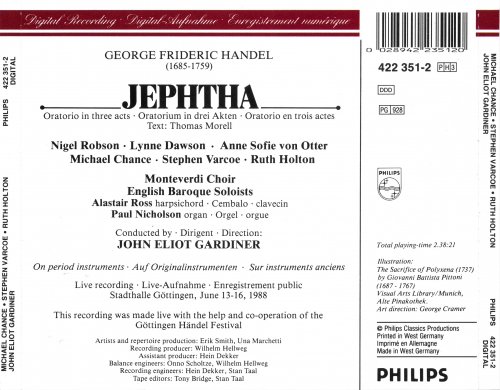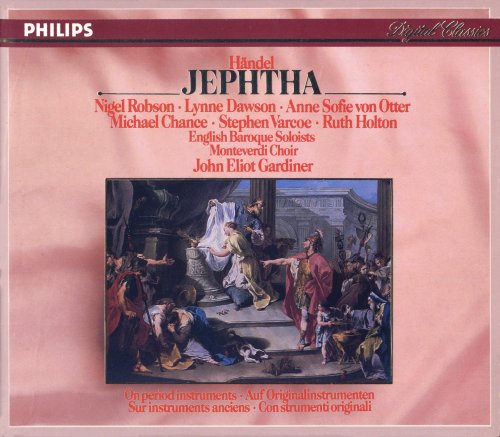
John Eliot Gardiner - Handel: Jephtha (1989)
BAND/ARTIST: Stephen Varcoe, Monteverdi Choir, English Baroque Soloists, John Eliot Gardiner
- Title: Handel: Jephtha
- Year Of Release: 1989
- Label: Philips
- Genre: Classical
- Quality: FLAC (image + .cue, log, artwork)
- Total Time: 02:38:13
- Total Size: 847 MB
- WebSite: Album Preview
Tracklist:
CD 1
01. Overture – Menuet [5:11]
ACT I
02. Scene 1. It must be so: or these vile Ammonites (Zebul) [1:23]
03. Scene 1. Pour forth no more unheeded pray'rs (Zebul) [2:51]
04. Scene 1. No more to Ammon's god and king (Chorus) [2:55]
05. Scene 2. But Jephtha comes (Zebul, Jephtha) [0:53]
06. Scene 2. Virtue my soul shall still embrace (Jephtha) [4:07]
07. Scene 2. 'Twill be a painful separation, Jephtha (Storge) [4:59]
08. Scene 3. Happy this embassy, my charming Iphis (Hamor) [3:50]
09. Scene 3. Ill suits the voice of love when glory calls (Iphis) [4:14]
10. Scene 3. I go, My soul, inspir'd by thy command (Hamor, Iphis) [7:28]
11. Scene 4. What mean these doubtful fancies (Jephtha) [1:57]
12. Scene 4. O God, behold our sore distress (Chorus) [4:34]
13. Scene 5. Some dire even hangs o'er our heads (Storge) [4:58]
14. Scene 6. Say, my dear mother (Iphis) [0:53]
15. Scene 6. The smiling dawn of happy days (Iphis) [3:33]
16. Scene 7. Such, Jephtha, was the haughty king's reply (Zebul, Jephtha) [0:27]
17. Scene 7. When his loud voice in thunder spoke (Chorus) [4:39]
CD 2
ACT II
01. Scene 1. Glad tidings of great joy to thee, dear Iphis (Hamor) [1:15]
02. Scene 1. Cherub and Seraphim, unbodied forms (Shorus) [3:12]
03. Scene 1. Up the dreadful steep ascending (Hamor) [4:15]
04. Scene 1. 'Tis well. Haste, haste, ye maidens (Iphis) [4:43]
05. Scene 2. Heav'n smiles once more on his repentant people (Jephtha) [6:28]
06. Scene 3. In glory high, in might serene (Chorus) [2:32]
07. Scene 3. Symphony - Hail glorious conqueror! (Iphis) [1:30]
08. Scene 3. Welcome as the cheerful light (Iphis, Chorus) [3:52]
09. Scene 3. Horror! confusion! (Jephtha) [4:59]
10. Scene 3. Why is my brother thus afflicted (Zebul, Jephtha) [0:58]
11. Scene 3. First perish thou, and perish all the world! (Storge) [2:20]
12. Scene 3. If such thy cruel purpose (Hamor) [1:48]
13. Scene 3. O spare your daughter (Zebul, Storge, Hamor, Jephtha) [3:13]
14. Scene 4. Such news flies swift (Iphis) [1:21]
15. Scene 4. Happy they! this vital breath (Iphis) [3:30]
16. Scene 4. Deeper, and deeper still (Jephtha) [3:26]
17. Scene 4. How dark, O Lord, are Thy decrees! (Chorus) [8:04]
CD 3
ACT III
01. Scene 1. Hide thou thy hated beams, O sun (Jephtha) [3:02]
02. Scene 1. Waft her, angels, through the skies (Jephtha) [4:30]
03. Scene 1. Ye sacred priests (Iphis) [6:28]
04. Scene 1. Doubtful fear and rev'rent awe (Shorus) [3:50]
05. Scene 1. Symphony [2:45]
06. Scene 1. Rise, Jephtha, and ye rev'rend priests (Angel) [1:01]
07. Scene 1. Happy, Iphis shalt thou live (Angel) [4:00]
08. Scene 1. For ever blessed be Thy holy name (Jephtha) [1:29]
09. Scene 1. Theme sublime of endless praise (Chorus) [3:23]
10. Scene 2. Let me congratulate this happy turn (Zebul) [2:22]
11. Scene 2. O let me fold thee in a mother's arms (Storge) [2:16]
12. Scene 2. My faithful Hamor, may that Providence (Iphis) [3:37]
13. Scene 2. Ye house of Gilead, with one voice (Chorus) [3:00]
14. Applause [0:19]

CD 1
01. Overture – Menuet [5:11]
ACT I
02. Scene 1. It must be so: or these vile Ammonites (Zebul) [1:23]
03. Scene 1. Pour forth no more unheeded pray'rs (Zebul) [2:51]
04. Scene 1. No more to Ammon's god and king (Chorus) [2:55]
05. Scene 2. But Jephtha comes (Zebul, Jephtha) [0:53]
06. Scene 2. Virtue my soul shall still embrace (Jephtha) [4:07]
07. Scene 2. 'Twill be a painful separation, Jephtha (Storge) [4:59]
08. Scene 3. Happy this embassy, my charming Iphis (Hamor) [3:50]
09. Scene 3. Ill suits the voice of love when glory calls (Iphis) [4:14]
10. Scene 3. I go, My soul, inspir'd by thy command (Hamor, Iphis) [7:28]
11. Scene 4. What mean these doubtful fancies (Jephtha) [1:57]
12. Scene 4. O God, behold our sore distress (Chorus) [4:34]
13. Scene 5. Some dire even hangs o'er our heads (Storge) [4:58]
14. Scene 6. Say, my dear mother (Iphis) [0:53]
15. Scene 6. The smiling dawn of happy days (Iphis) [3:33]
16. Scene 7. Such, Jephtha, was the haughty king's reply (Zebul, Jephtha) [0:27]
17. Scene 7. When his loud voice in thunder spoke (Chorus) [4:39]
CD 2
ACT II
01. Scene 1. Glad tidings of great joy to thee, dear Iphis (Hamor) [1:15]
02. Scene 1. Cherub and Seraphim, unbodied forms (Shorus) [3:12]
03. Scene 1. Up the dreadful steep ascending (Hamor) [4:15]
04. Scene 1. 'Tis well. Haste, haste, ye maidens (Iphis) [4:43]
05. Scene 2. Heav'n smiles once more on his repentant people (Jephtha) [6:28]
06. Scene 3. In glory high, in might serene (Chorus) [2:32]
07. Scene 3. Symphony - Hail glorious conqueror! (Iphis) [1:30]
08. Scene 3. Welcome as the cheerful light (Iphis, Chorus) [3:52]
09. Scene 3. Horror! confusion! (Jephtha) [4:59]
10. Scene 3. Why is my brother thus afflicted (Zebul, Jephtha) [0:58]
11. Scene 3. First perish thou, and perish all the world! (Storge) [2:20]
12. Scene 3. If such thy cruel purpose (Hamor) [1:48]
13. Scene 3. O spare your daughter (Zebul, Storge, Hamor, Jephtha) [3:13]
14. Scene 4. Such news flies swift (Iphis) [1:21]
15. Scene 4. Happy they! this vital breath (Iphis) [3:30]
16. Scene 4. Deeper, and deeper still (Jephtha) [3:26]
17. Scene 4. How dark, O Lord, are Thy decrees! (Chorus) [8:04]
CD 3
ACT III
01. Scene 1. Hide thou thy hated beams, O sun (Jephtha) [3:02]
02. Scene 1. Waft her, angels, through the skies (Jephtha) [4:30]
03. Scene 1. Ye sacred priests (Iphis) [6:28]
04. Scene 1. Doubtful fear and rev'rent awe (Shorus) [3:50]
05. Scene 1. Symphony [2:45]
06. Scene 1. Rise, Jephtha, and ye rev'rend priests (Angel) [1:01]
07. Scene 1. Happy, Iphis shalt thou live (Angel) [4:00]
08. Scene 1. For ever blessed be Thy holy name (Jephtha) [1:29]
09. Scene 1. Theme sublime of endless praise (Chorus) [3:23]
10. Scene 2. Let me congratulate this happy turn (Zebul) [2:22]
11. Scene 2. O let me fold thee in a mother's arms (Storge) [2:16]
12. Scene 2. My faithful Hamor, may that Providence (Iphis) [3:37]
13. Scene 2. Ye house of Gilead, with one voice (Chorus) [3:00]
14. Applause [0:19]

John Eliot Gardiner is one of the leading conductors in the active authentic performances movement in England, performing Baroque music but also extending his range into later repertoire. He first conducted at the age of 15, and after finishing school he studied at King's College, Cambridge. While still an undergraduate, he conducted the combined Oxford and Cambridge Singers on a 1964 tour of the Middle East and founded the Monteverdi Choir, which has consistently performed on his recordings since.
After graduation, he went to Paris to study with Nadia Boulanger and then studied as a postgraduate at King's College, London, with early music leader Thurston Dart. His first notable engagement as a conductor was at a Promenade Concert in London in 1969 and he first conducted an opera in London (Gluck's Iphigénie en Tauride) at Covent Garden in 1973.
He had continued conducting the Monteverdi Choir, then founded the English Baroque Soloists, specializing in Baroque music played on original-style instruments. The EBS first appeared at the 1977 Innsbruck Festival of Early Music and has appeared with the Monteverdi Choir on many recordings.
He made his American debut in 1979 leading the Dallas Symphony Orchestra, part of an active and often overlooked aspect of his career: conducting standard repertoire on modern instruments. This included a period as principal conductor (1980-1983) of the CBC Vancouver Symphony Orchestra; music director of the Opera de Lyon (1983-1988), which included founding an entirely new orchestra; and principal conductor of the North German Radio Symphony Orchestra in Hamburg (1991-1994).
He expanded his activities in the original-style instruments movement by recognizing that from the Classical era and well into the Romantic age there were distinctly different instrument designs than those that are standard today. As a result, he founded another new orchestra, the Orchéstre Révolutionnaire et Romantique, to specialize in that period with authentic instruments.
He has also been an active guest conductor, leading major orchestras of the world, including the Cleveland, Berlin Philharmonic, Royal Concertgebouw, Vienna Philharmonic, and Philharmonia orchestras, and has conducted the Puccini opera Manon Lescaut at Glyndebourne. He led a cycle of all seven mature Mozart operas and has conducted over 250 recordings on Deutsche Grammophon and Erato labels. He and Herbert von Karajan share the record for the most Gramophone Awards in a single year (three), while Gardiner has won more of them over the years than any other artist.
The year 2000 marked the beginning of the Bach Cantata Pilgrimage, where Gardiner led performances of the complete sacred cantatas in the United States and Europe. He followed up this project with a 2004 tour around Spain with the Monteverdi Choir, performing selections from the Codex Compostelanus in churches along the Way of St. James. -- Joseph Stevenson
After graduation, he went to Paris to study with Nadia Boulanger and then studied as a postgraduate at King's College, London, with early music leader Thurston Dart. His first notable engagement as a conductor was at a Promenade Concert in London in 1969 and he first conducted an opera in London (Gluck's Iphigénie en Tauride) at Covent Garden in 1973.
He had continued conducting the Monteverdi Choir, then founded the English Baroque Soloists, specializing in Baroque music played on original-style instruments. The EBS first appeared at the 1977 Innsbruck Festival of Early Music and has appeared with the Monteverdi Choir on many recordings.
He made his American debut in 1979 leading the Dallas Symphony Orchestra, part of an active and often overlooked aspect of his career: conducting standard repertoire on modern instruments. This included a period as principal conductor (1980-1983) of the CBC Vancouver Symphony Orchestra; music director of the Opera de Lyon (1983-1988), which included founding an entirely new orchestra; and principal conductor of the North German Radio Symphony Orchestra in Hamburg (1991-1994).
He expanded his activities in the original-style instruments movement by recognizing that from the Classical era and well into the Romantic age there were distinctly different instrument designs than those that are standard today. As a result, he founded another new orchestra, the Orchéstre Révolutionnaire et Romantique, to specialize in that period with authentic instruments.
He has also been an active guest conductor, leading major orchestras of the world, including the Cleveland, Berlin Philharmonic, Royal Concertgebouw, Vienna Philharmonic, and Philharmonia orchestras, and has conducted the Puccini opera Manon Lescaut at Glyndebourne. He led a cycle of all seven mature Mozart operas and has conducted over 250 recordings on Deutsche Grammophon and Erato labels. He and Herbert von Karajan share the record for the most Gramophone Awards in a single year (three), while Gardiner has won more of them over the years than any other artist.
The year 2000 marked the beginning of the Bach Cantata Pilgrimage, where Gardiner led performances of the complete sacred cantatas in the United States and Europe. He followed up this project with a 2004 tour around Spain with the Monteverdi Choir, performing selections from the Codex Compostelanus in churches along the Way of St. James. -- Joseph Stevenson
Related Releases:
Classical | FLAC / APE | CD-Rip
As a ISRA.CLOUD's PREMIUM member you will have the following benefits:
- Unlimited high speed downloads
- Download directly without waiting time
- Unlimited parallel downloads
- Support for download accelerators
- No advertising
- Resume broken downloads


